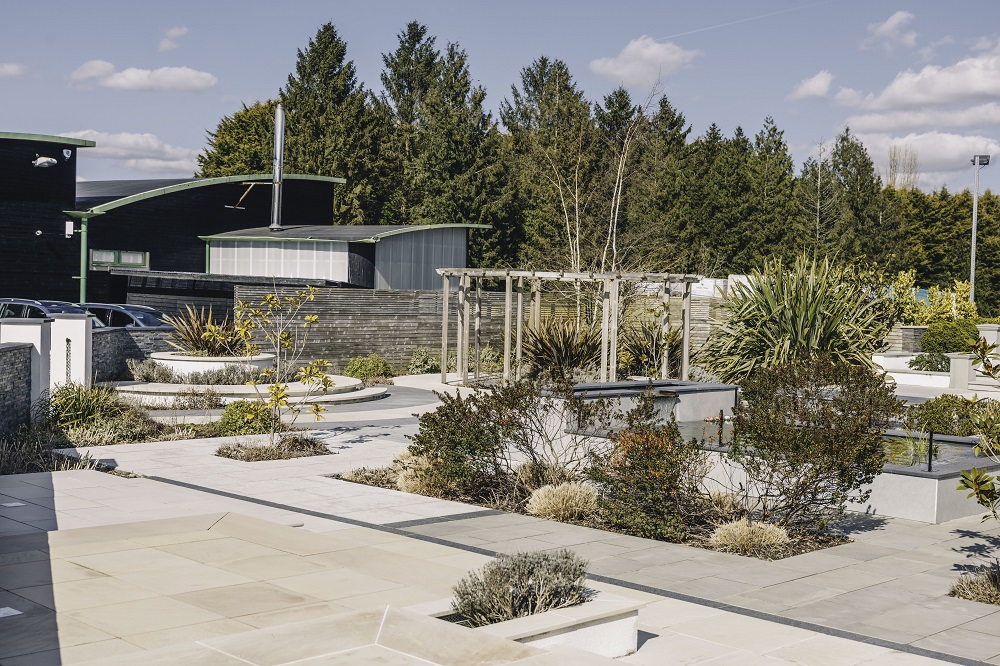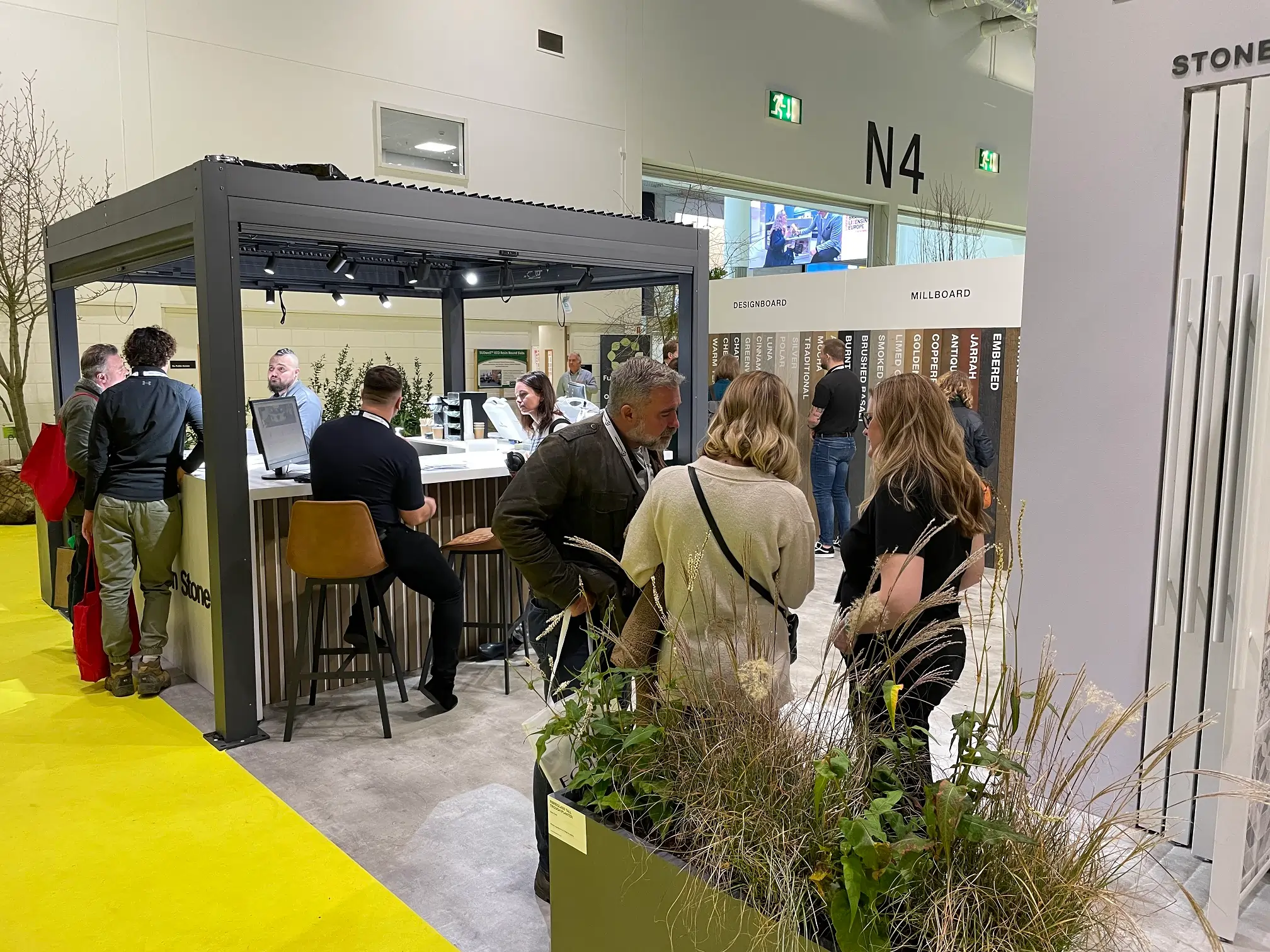Paving in your garden can make or break the space. There are endless possibilities and a wide variety of factors to consider when paving your property.
For gardens in Britain, a patio is an integral part of a garden design, forming a transition between the rear of the house and the garden beyond. The current trend is for larger paved areas than previously, as entertaining and relaxing outdoors has become so popular in the summer months. Therefore, at London Stone, as specialist stone paving stockists, we’ve created a buyer’s guide.
In this guide, we’ll break down some of the key aspects of paving to consider, from styles and materials to colours and shapes - as well as considering the source of your stone.
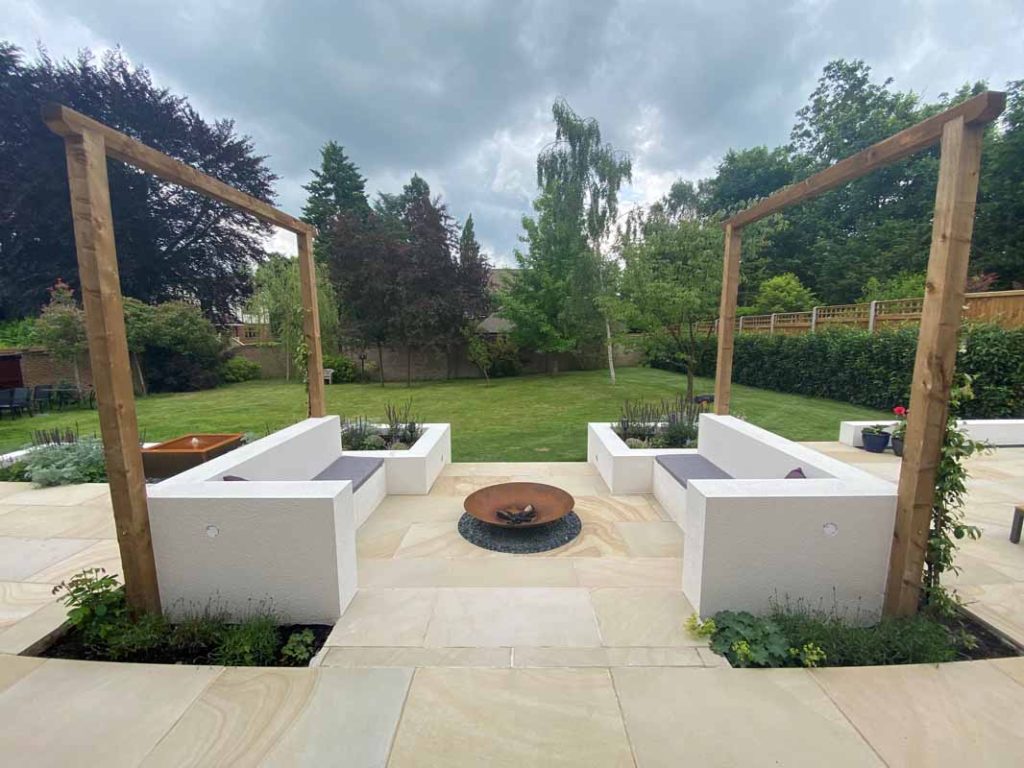
Choose A Style
While not solely down to the paving that you choose, the overall style that you want to achieve should be the first thing you consider.
Are you trying to match your outdoor patio area to your country cottage terrace, or simply trying to achieve the traditional look alongside a modern home? A contemporary, modern look is also popular with many homeowners, keeping tight control with clean lines and symmetrical shapes.
Even when trying to recreate a specific style, such as a Japanese garden, there are different routes you can take. From the clean, minimalist aesthetic to the more textured and rustic feel of ancient Japanese gardens, aligning with a specific style will help in the selection of paving to suit.
Choose A Material
There are so many materials we stock at London Stone that it’s hard to cover them all. Hopefully, with the details of just some of our products, you’ll begin to get a feel for which material will best suit your design requirements.
Indian Sandstone
The wonderful, natural riven surface and a wide variety of autumn brown colours have made Indian sandstone paving one of the most popular choices for both small and large paved areas in either an urban or rural setting. Some colours lend themselves more readily to particular locations, such as Autumn Brown for traditional settings, Kandla Grey to match green foliage, Raj Green for a countryside terrace or Mint and Fossil Mint for greater contrasts.
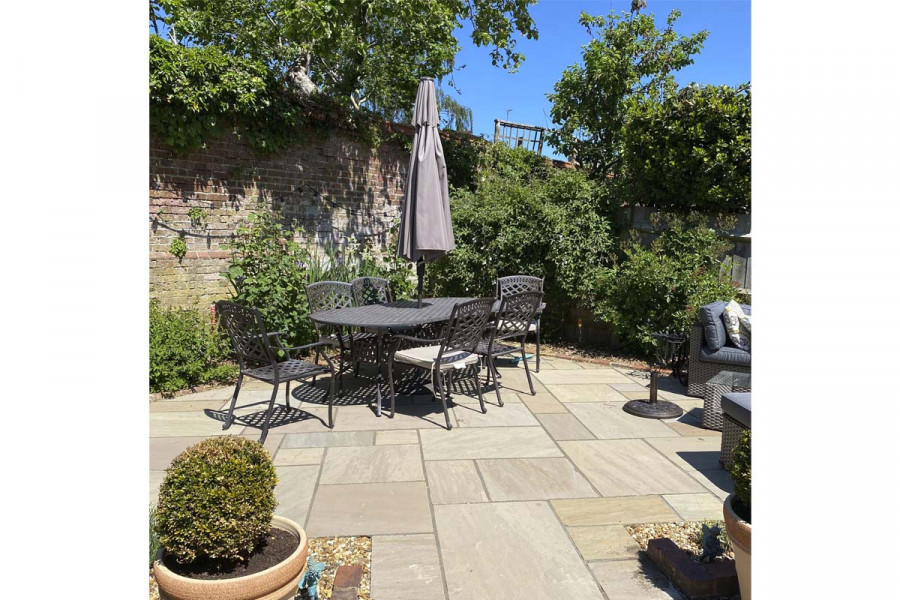
Yorkstone Paving
Yorkstone has been used as a paving material in the UK for centuries. It’s a tried and trusted natural stone with a character that improves with age. Yorkstone is generally supplied in three different formats: Sawn Yorkstone Paving, Reclaimed Yorkstone Paving and New Riven Yorkstone. The one drawback with Yorkstone, and with the majority of native stones, is the cost. With such a wide choice of cheaper imported natural stones available, native stones are getting increasingly pushed down the pecking order.
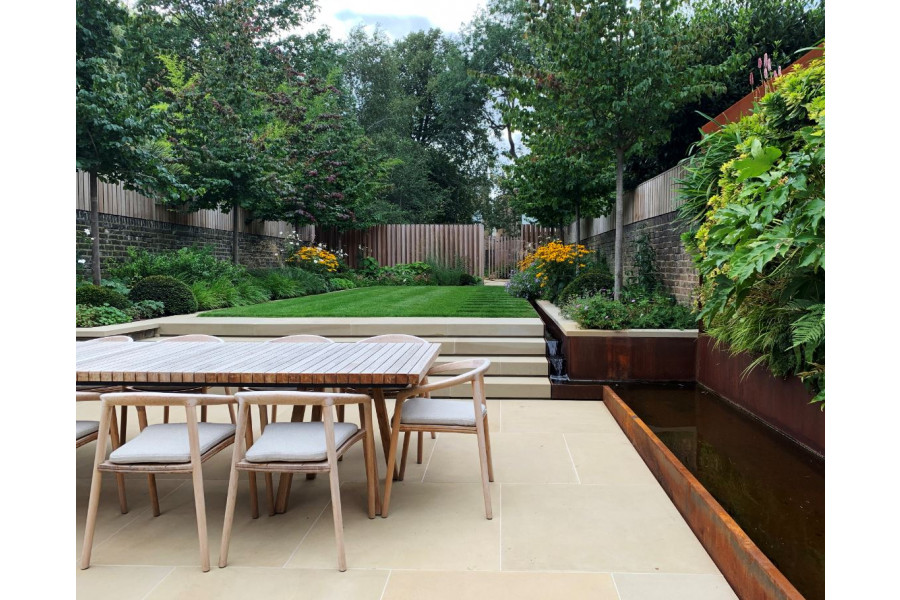
Reclaimed Yorkstone
Reclaimed Yorkstone is ideal for areas that will see heavy foot traffic, which is why it is used in pavement construction across London. Constant foot traffic weathers and smooths the surface of the Yorkstone and gives it a beautiful antique look, offering better durability over a longer period of time. It is also very popular when people are trying to match paving to existing materials. Most importantly, Yorkstone has a proven track record of suitability for the climate in Great Britain.
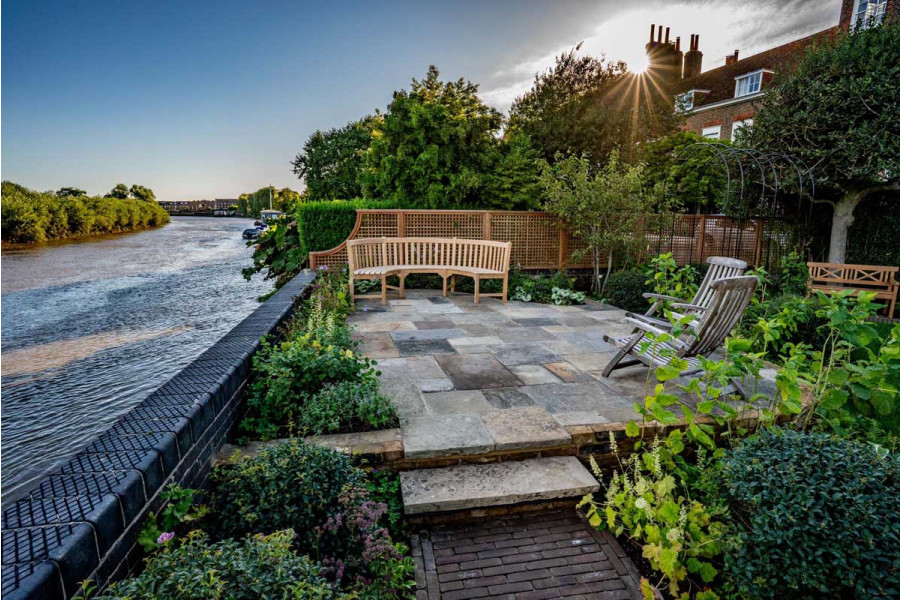
Granite Paving
One of the toughest paving materials available, it provides a modern look to any garden or commercial space with a tight grain, even texture and consistent colouring for that flawless finish you’re after. It is, however, harder to cut than other natural stones - something to be aware of if you’re installing it yourself.
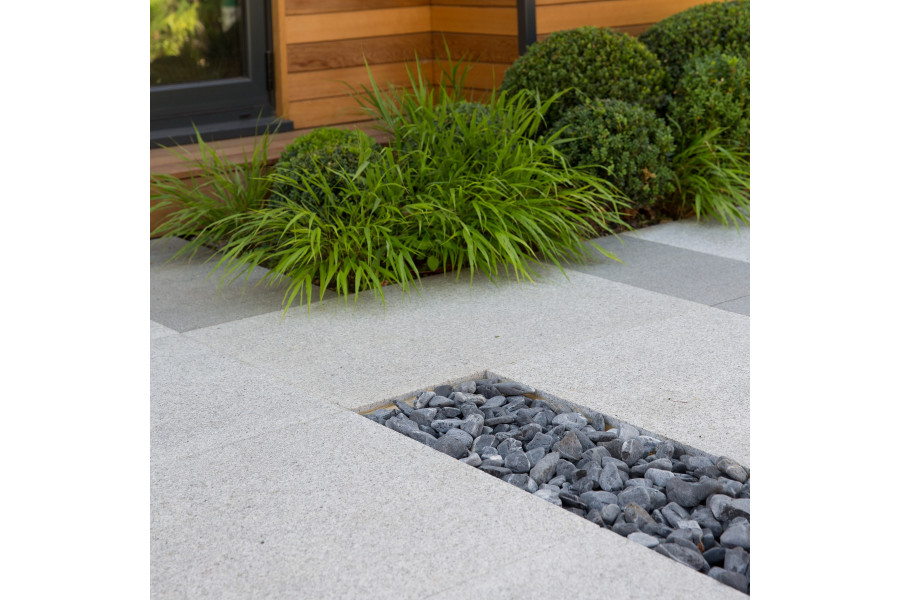
Limestone Paving
Low maintenance and the ability to stand up to the test of British weather makes this a popular choice for some designers. Plus, there are a range of colours and textures in limestone paving - including Midnight Black, Antique Yellow and Graphite Grey - and something to suit nearly every budget.
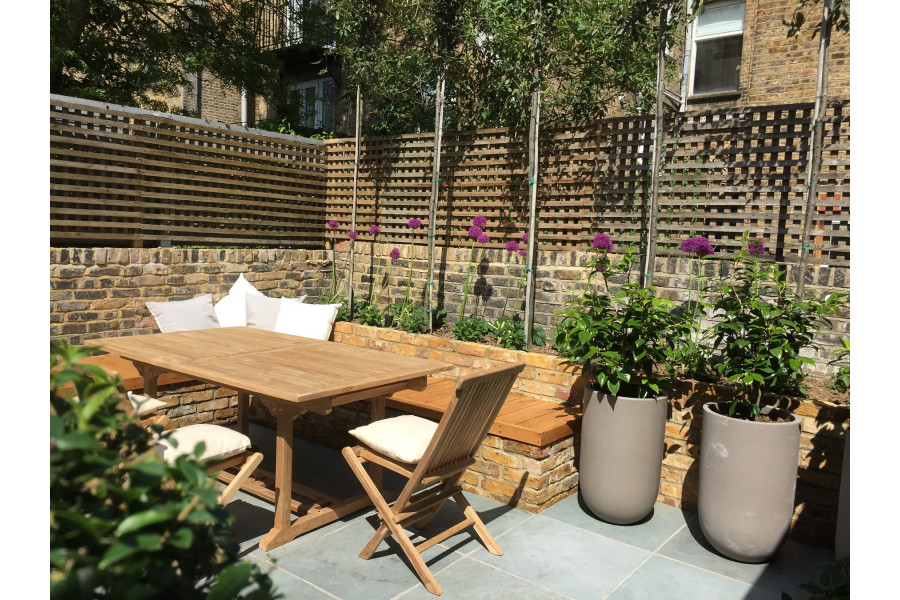
Slate Paving
Suited to contemporary designs or for contrasting with period buildings, slate is famed for its ability to create a flat surface. With natural texture, density and low porosity, it not only looks great but it’s stain-resistant too. A low maintenance option with a high-end, luxury feel, our Brazilian slate range is best suited for areas that will catch the sunlight in your garden.
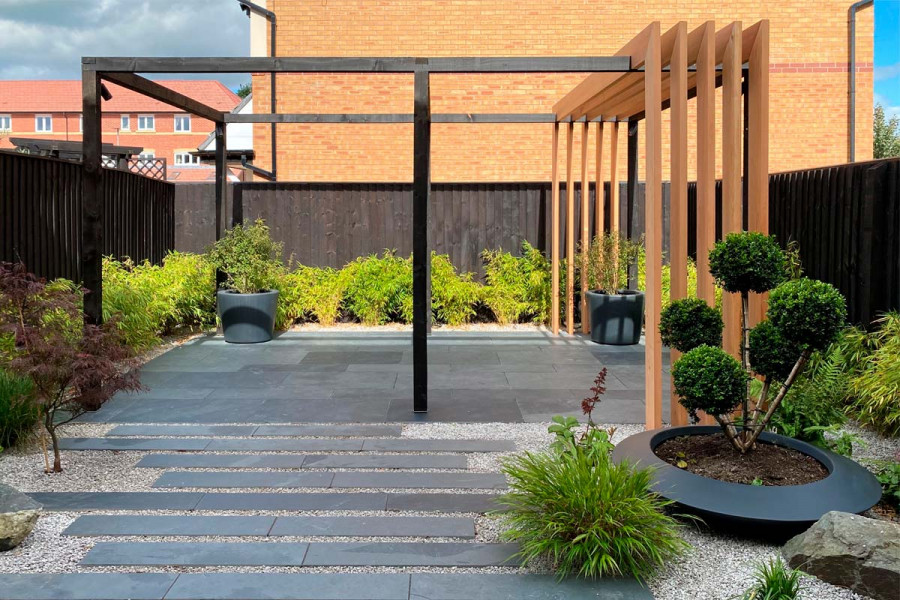
Porcelain Paving
In a category all of its own, porcelain provides a touch of luxury to any garden but is better suited to modern designs where clean, minimalist lines are required. With consistent colouring and texture, you can achieve a high-end finish that looks effortless. We mainly source our porcelain range from Italy, with luxury and premium ranges.
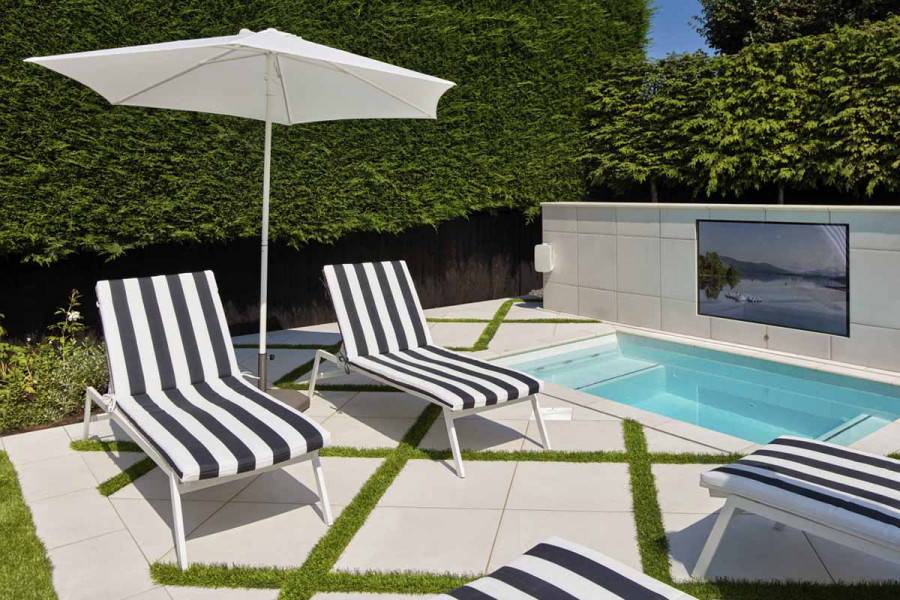
Choose A Size And Shape
On first impressions, it may seem that natural stone is a hard and inflexible material, but this is certainly not the case. With the right tools and skills, natural stone can be crafted and then utilised in a wide variety of applications.
The size and shape of the stones you opt for will likely influence how they are laid, too. Many prefer to randomise this aspect of the design to create unique patterns and shapes. However, if you want to incorporate a focal piece, such as a circle-cut stone, or if you want to lead the eye through a space, then careful consideration should be given to how you’ll lay the paving. This, in turn, will mean choosing a size and shape to suit.
Contemporary designs, as mentioned previously, also require more careful planning to ensure a sense of symmetry and control, an aesthetic you can direct with your paving.
Choose A Colour
The all-important colour comes from the type of sandstone, limestone, slate or granite and ranges from the palest cream of travertine through to black basalt, with shades of grey, beige and brown in between.
The selection of stones on offer means there are colours to suit every situation. Our tumbled paving, which when tumbled takes on an aged look, is perfect for an informal patio in a country or traditional setting, as is the range of setts that resemble cobblestones.
Consider the following in relation to paving colours:
- Do you want a consistent colour or mixed shades?
- Do you want to match or contrast with the rest of your property?
- Do you need to match it with existing garden furniture?
- Will the paving be exposed to consistent sunlight?
- How will the colour look when wet and when dry?
- Will the colour complement any walls or steps?
Choose An Ethical Source

The first time we heard about ethically sourced sandstone paving was back in 2006. We had just started out in the natural stone business and were more focused on surviving our first year in business than what was happening in our foreign supply chains.
As the business stabilised, and after hearing stories of poor working conditions in India, we resolved, as a business, that we would make it our business to understand what was happening in our supply chains and to work with our suppliers to improve conditions for the people that were part of our success.
Nothing happens quickly when working with overseas suppliers to implement positive changes. After our first 18 months, ethical trading began to have a real impact on the way we ran our business, particularly in how we procured our sandstone and limestone paving from India. You can find out more about London Stone’s ethical trading policy via our dedicated page.
Here at London Stone, we stock a wide range of stone and porcelain paving with free delivery (T&Cs apply). Browse our selection online today or visit your nearest showroom in the UK. Alternatively, you can call our different teams using our contact page.


/filters:quality(60)/mediadev/media/menu-pics/all-porcelain.jpg )
/filters:quality(60)/mediadev/media/menu-pics/luxury-italian.jpg )
/filters:quality(60)/mediadev/media/menu-pics/premium-italian.jpg )
/filters:quality(60)/mediadev/media/menu-pics/budget-porcelain.jpg )
/filters:quality(60)/mediadev/media/menu-pics/large-format-porcelain.jpg )
/filters:quality(60)/mediadev/media/menu-pics/wood-effect-porcelain.jpg )
/filters:quality(60)/mediadev/media/menu-pics/porcelain-planks.jpg )
/filters:quality(60)/mediadev/media/menu-pics/porcelain-setts.jpg )
/filters:quality(60)/mediadev/media/menu-pics/browse-all-paving.jpg )
/filters:quality(60)/mediadev/media/menu-pics/stone-paving.jpg )
/filters:quality(60)/mediadev/media/menu-pics/interior-tiles.jpg )
/filters:quality(60)/mediadev/media/menu-pics/stone-effect-porcelain.png )
/filters:quality(60)/mediadev/media/menu-pics/wood-effect-porcelain.png )
/filters:quality(60)/mediadev/media/menu-pics/grey-porcelain.png )
/filters:quality(60)/mediadev/media/menu-pics/beige-porcelain.png )
/filters:quality(60)/mediadev/media/menu-pics/dark-porcelain.png )
/filters:quality(60)/mediadev/media/menu-pics/light-porcelain.png )
/filters:quality(60)/mediadev/media/menu-pics/patio-grout.jpg)
/filters:quality(60)/mediadev/media/menu-pics/primers.jpg)
/filters:quality(60)/mediadev/media/menu-pics/porcelain-blades.jpg)
/filters:quality(90)/mediadev/media/menu-pics/drainage.jpg)
/filters:quality(60)/mediadev/media/menu-pics/cleaners.jpg)
/filters:quality(60)/mediadev/media/menu-pics/all-stone-paving.jpg )
/filters:quality(60)/mediadev/media/menu-pics/all-sawn-paving.jpg )
/filters:quality(60)/mediadev/media/menu-pics/all-riven-paving.jpg )
/filters:quality(60)/mediadev/media/menu-pics/indian-sandstone.jpg )
/filters:quality(60)/mediadev/media/menu-pics/limestone-paving.jpg )
/filters:quality(60)/mediadev/media/menu-pics/granite-paving.jpg )
/filters:quality(60)/mediadev/media/menu-pics/slate-paving.jpg )
/filters:quality(60)/mediadev/media/menu-pics/yorkstone-paving.jpg )
/filters:quality(60)/mediadev/media/menu-pics/stone-pavers.jpg )
/filters:quality(60)/mediadev/media/menu-pics/cobbles-setts.jpg )
/filters:quality(60)/mediadev/media/menu-pics/plank-paving.jpg )
/filters:quality(60)/mediadev/media/menu-pics/paving-circles.jpg )
/filters:quality(60)/mediadev/media/menu-pics/bespoke-paving-1.jpg )
/filters:quality(60)/mediadev/media/menu-pics/edging-stones-1.jpg )
/filters:quality(60)/mediadev/media/menu-pics/prestige-stone.jpg )
/filters:quality(60)/mediadev/media/menu-pics/grey-blue-stone.png)
/filters:quality(60)/mediadev/media/menu-pics/swatch-black-dark.jpg )
/filters:quality(60)/mediadev/media/menu-pics/swatch-buff-beige-white.jpg )
/filters:quality(60)/mediadev/media/menu-pics/sealants.jpg)
/filters:quality(60)/mediadev/media/menu-pics/all-clay-paving.jpg )
/filters:quality(60)/mediadev/media/menu-pics/alpha-clay-pavers.jpg )
/filters:quality(60)/mediadev/media/menu-pics/cottage-garden-clay-pavers.jpg )
/filters:quality(60)/mediadev/media/menu-pics/kessel-garden-clay-pavers.jpg )
/filters:quality(60)/mediadev/media/menu-pics/artisan-clay-pavers.jpg )
/filters:quality(60)/mediadev/media/menu-pics/grey-blue-clay-paver.png )
/filters:quality(60)/mediadev/media/menu-pics/red-brown-clay-pavers.png )
/filters:quality(60)/mediadev/media/menu-pics/beige-buff-clay-pavers.png )
/filters:quality(60)/mediadev/media/menu-pics/composite-decking.jpg )
/filters:quality(60)/mediadev/media/menu-pics/designboard-decking.jpg )
/filters:quality(60)/mediadev/media/menu-pics/classic-designboard.jpg )
/filters:quality(60)/mediadev/media/menu-pics/brushed-designboard.jpg )
/filters:quality(60)/mediadev/media/menu-pics/grooved-designboard.jpg )
/filters:quality(60)/mediadev/media/menu-pics/millboard-decking.jpg )
/filters:quality(60)/mediadev/media/menu-pics/grey-decking.jpg )
/filters:quality(60)/mediadev/media/menu-pics/black-charcoal-decking.jpg)
/filters:quality(60)/mediadev/media/menu-pics/brown-decking.jpg)
/filters:quality(60)/mediadev/media/menu-pics/all-build-deck.png )
/filters:quality(60)/mediadev/media/menu-pics/stone-cladding.jpg )
/filters:quality(60)/mediadev/media/menu-pics/all-garden-walling-1.jpg )
/filters:quality(60)/mediadev/media/menu-pics/facing-bricks.jpg )
/filters:quality(60)/mediadev/media/menu-pics/garden-screening.jpg )
/filters:quality(60)/mediadev/media/menu-pics/all-steps-coping.jpg )
/filters:quality(60)/mediadev/media/menu-pics/stone-garden-steps.jpg )
/filters:quality(60)/mediadev/media/menu-pics/sawn-steps.jpg )
/filters:quality(60)/mediadev/media/menu-pics/riven-steps.jpg )
/filters:quality(60)/mediadev/media/menu-pics/yorkstone-steps.jpg )
/filters:quality(60)/mediadev/media/menu-pics/bespoke-steps.jpg )
/filters:quality(60)/mediadev/media/menu-pics/porcelain-steps.jpg )
/filters:quality(60)/mediadev/media/menu-pics/off-the-shelf.jpg )
/filters:quality(60)/mediadev/media/menu-pics/stone-coping.jpg )
/filters:quality(60)/mediadev/media/menu-pics/sawn-coping.jpg )
/filters:quality(60)/mediadev/media/menu-pics/riven-coping.jpg )
/filters:quality(60)/mediadev/media/menu-pics/yorkstone-coping.jpg )
/filters:quality(60)/mediadev/media/menu-pics/bespoke-coping.jpg )
/filters:quality(60)/mediadev/media/menu-pics/stone-pier-caps.jpg )
/filters:quality(60)/mediadev/media/menu-pics/porcelain-coping.jpg )
/filters:quality(60)/mediadev/media/menu-pics/all-bespoke-services.jpg )
/filters:quality(60)/mediadev/media/menu-pics/bespoke-paving-2.jpg )
/filters:quality(60)/mediadev/media/menu-pics/bespoke-steps-1.jpg )
/filters:quality(60)/mediadev/media/menu-pics/bespoke-coping-1.jpg )
/filters:quality(60)/mediadev/media/menu-pics/edge-profiles.jpg )
/filters:quality(60)/mediadev/media/menu-pics/masonry-services.jpg )
/filters:quality(60)/mediadev/media/menu-pics/deluxe-pergolas.jpg )
/filters:quality(60)/mediadev/media/menu-pics/proteus-pergolas.jpg )


